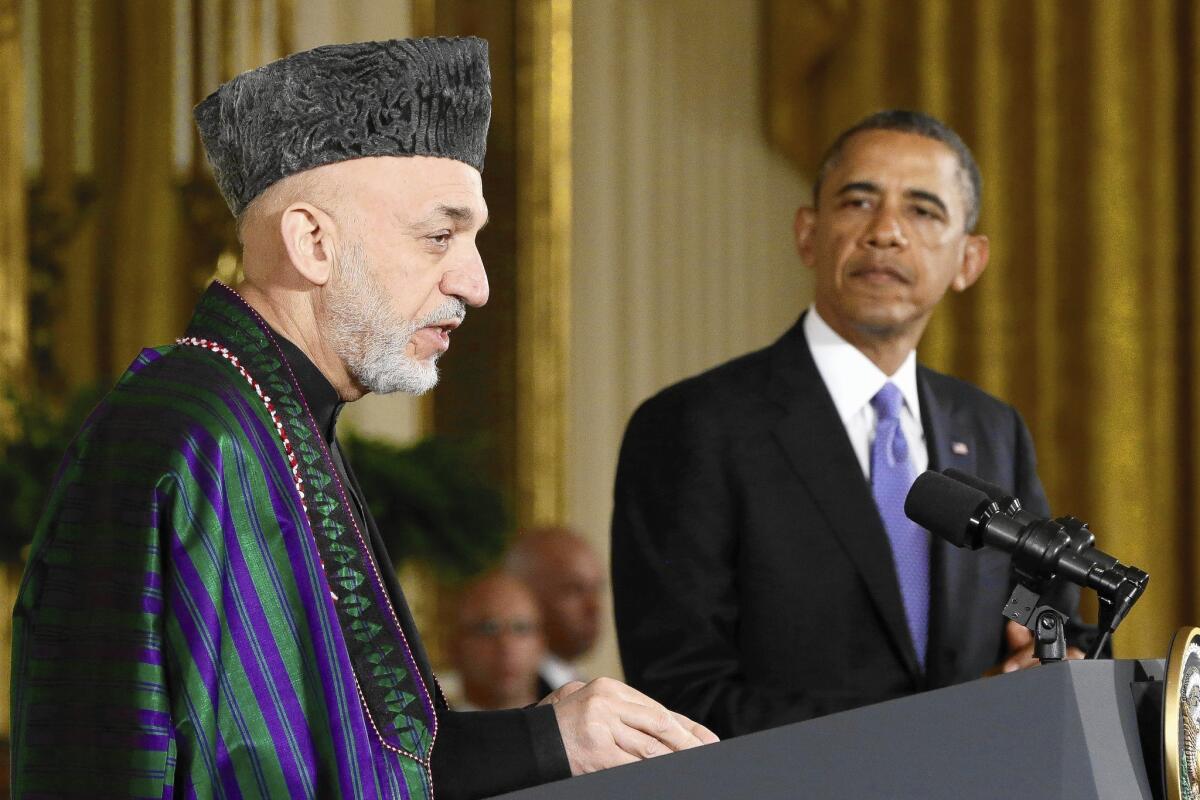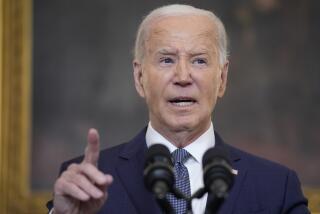President Obama pressures Afghanistan leader Karzai on security deal

WASHINGTON — Signaling his frustration with events in Afghanistan, President Obama ordered the Pentagon on Tuesday to step up plans to withdraw all U.S. troops by January if Afghan leaders don’t sign a bilateral security agreement.
In an unusually blunt statement, the White House said Obama had telephoned Afghan President Hamid Karzai to make it clear that he had authorized new contingency planning before a two-day meeting of NATO and allied defense ministers in Brussels this week that will focus on long-term security efforts in Afghanistan.
Obama said it was still possible to conclude an agreement after elections to choose Karzai’s successor on April 5. But he warned that “the longer we go” without a deal, “the more likely it will be that any post-2014 U.S. mission will be smaller in scale and ambition.”
Republican critics have said keeping U.S. special operations forces and drone bases in place is crucial for battling terrorist networks in neighboring Pakistan. But Obama appeared to downplay that mission, saying “going after the remnants of core Al Qaeda could be in the interests” of the United States and Afghanistan.
Secretary of Defense Chuck Hagel, who was traveling to the NATO meeting in Brussels, called it a “prudent step” to start planning for a complete pullout of the 33,600 U.S. troops still in Afghanistan after nearly 13 years of war.
“We were not actively planning for complete withdrawal and now we will,” said Rear Adm. John Kirby, the Pentagon press secretary.
The harsh language highlights the rift between Obama and Karzai, as well as growing reluctance in the White House to further extend what already is the longest war in U.S. history.
Obama has made clear his intention to end America’s wartime footing, and the announcement comes a day after Hagel previewed a proposed Pentagon budget that would cut 120,000 personnel from the active and reserve Army ranks, retire entire fleets of Air Force aircraft and mothball 11 Navy warships.
White House officials have hinted for months that they would consider pulling all U.S. troops out by year’s end, but the so-called zero option was widely seen as a ploy to pressure Karzai to approve the bilateral accord, which gives U.S. troops legal protection for their actions. The Afghan leader has given no indication he will sign, however.
Now some senior Obama aides have begun to embrace the prospect of a full pullout, arguing it would be both politically popular at home and strategically viable given other military options in the region, according to a senior administration official who declined to identify the aides. The administration’s contingency plans include using air bases in Central Asia to conduct drone missile attacks in northwestern Pakistan, U.S. officials said this month.
Obama ordered all U.S. forces from Iraq in 2011 after Prime Minister Nouri Maliki refused to sign a similar bilateral security agreement. The administration now is providing weapons to help Maliki’s government fight Al Qaeda-linked militants and other extremists who overran the strategic city of Fallouja last month.
Pentagon officials say a pullout from Afghanistan could allow Taliban fighters to rebuild their forces, threaten the government in Kabul and deepen instability in Pakistan. Afghan security forces are improving, the officials say, but still need training and intelligence-gathering capabilities.
A U.S. withdrawal would result in “a proliferation of terrorist and other militant groups operating on both sides of the Afghan-Pakistan border,” said Seth Jones, a Rand Corp. analyst with close ties to the U.S. special operations and intelligence communities.
The loss of CIA bases for armed drone flights and intelligence operations also would limit U.S. options, said Richard Russell, professor of national security affairs at the National Defense University. “You need to have people on the ground exploiting leads.”
But Pentagon planners increasingly share the White House’s exasperation, particularly after Kabul released dozens of prisoners from the formerly U.S.-run prison at Bagram air base this month over strong U.S. objections. U.S. officials had turned over evidence linking the prisoners to attacks on coalition forces and Afghan civilians.
One U.S. Defense official said Obama’s announcement means military planners from America’s North Atlantic Treaty Organization allies and the International Security Assistance Force, who have an additional 19,000 troops in Afghanistan, can discuss options for pulling their forces out at the meetings in Brussels, which start Wednesday.
“This will help inject more certainty, not complete certainty, into the discussions,” said the official, who briefed reporters on condition of anonymity.
There was no immediate reaction from Karzai’s office. Former Afghan officials said Obama’s comments were unlikely to sway the Afghan leader, noting that he had ignored an influential council of Afghan dignitaries that overwhelmingly endorsed the security deal in November. The council included some Afghan presidential candidates.
“I don’t think that he will react to such pressure,” said Said Jawad, a former Afghan ambassador to Washington, who served on the council. “In the past, he has proven to enjoy saying no to the U.S. and acting much tougher than he is perceived to be.”
Times staff writers Christi Parsons and David S. Cloud contributed to this report.
More to Read
Sign up for Essential California
The most important California stories and recommendations in your inbox every morning.
You may occasionally receive promotional content from the Los Angeles Times.












